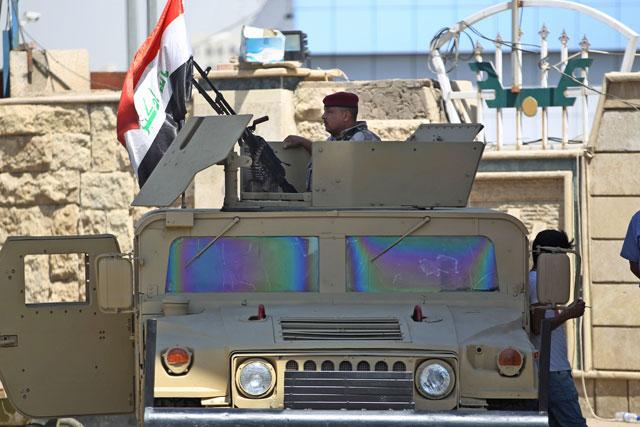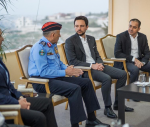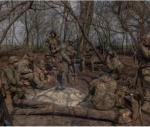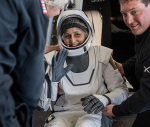You are here
After ballot box fire, Iraqi cleric Sadr warns of civil war
By Thomson Reuters Foundation - Jun 12,2018 - Last updated at Jun 12,2018
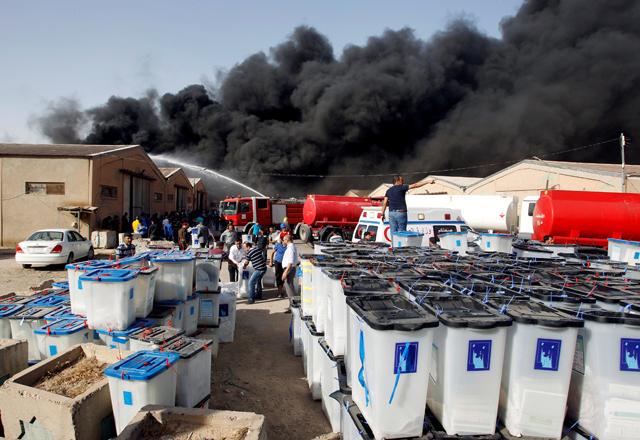
Smoke rises from a storage site in Baghdad, housing ballot boxes from Iraq’s May parliamentary election, Iraq, on Sunday (Reuters photo)
BAGHDAD — Shiite cleric Moqtada Al Sadr urged Iraqis on Monday to unite rather than squabble over a possible rerun of the election his bloc won last month, a message apparently meant to defuse political tension after a ballot box storage depot caught fire.
Certain parties are trying to drag Iraq into civil war, Sadr said, adding that he would not participate in one.
Parliament has mandated a manual recount of the election in which a number of parties alleged fraud. A storage site holding half of Baghdad’s ballot boxes went up in flames on Sunday in what Prime Minister Haider Al Abadi denounced as a “plot to harm the nation and its democracy”.
An Iraqi court ordered the arrest of four people accused of setting fire to the storage site, state television reported. Three of them were policemen and one an employee of the Independent high elections commission.
Iraqi authorities said the ballot boxes were saved but the fire has added to fears of violence.
“What Moqtada said about [Iraq] being close to some sort of armed conflict is concerning. The situation is tense and it seems to be on the brink of conflict,” said Renad Mansour, research fellow at Chatham House in London.
Sadr, a Shiite cleric who once led violent campaigns against the US occupation that ended in 2011, has emerged as a nationalist opponent of powerful Shiite Muslim parties allied with neighbouring Iran.
“Stop fighting for seats, posts, gains, influence, power and rulership,” he wrote in an article published by his office.
“Is it not time to stand as one for building and reconstruction, instead of burning ballot boxes or repeating elections just for one seat or two?”
Sadr has in the past mobilised tens of thousands of followers to protest government policies he opposed.
The election, which was the first since the defeat of Daesh militants who seized a third of Iraq in 2014, raised hopes that Iraqis could put aside sectarian divisions to rebuild.
One of Sadr’s top aides said on Sunday the fire was intended either to force a rerun of the election or to conceal fraud.
Election repeat unlikely
But a repeat of the election is unlikely, analysts say, as none of the top parties have endorsed this step, and many incumbent lawmakers have lost their seats and thus lack legitimacy in the eyes of the public.
The supreme federal court is the only entity that has the right to decide on a repeat, not the government or parliament, Abadi’s spokesman said on Monday.
A spokesman for Hadi Al Amiri, whose Fatih alliance of groups linked to pro-Iran Shiite militias came second in the election behind Sadr’s bloc, said he did not favour a repeat.
“The middle of the road solution is a manual recount,” said Karim Al Nuri, referring to the fraud allegations.
Some of Iran’s other supporters, such as former prime minister Nuri Al Maliki, whose bloc performed below expectations in the election, would benefit.
At the same time, a recount might harm Iran in other ways. Tehran is accused by some parties in two provinces of helping a Kurdish party allied with it commit election fraud.
“Iran would have preferred if Fatih and [Maliki’s] State of Law [list] had done better than Sadr so any kind of redo where a different scenario comes out is better for Iran,” said Mansour.
“It is not an ideal situation for Iran and they might support a redo, but actually a recount might implicate them if the allegations in the north are correct.”
Voting equipment
In the election, Iraq used an electronic vote-counting system for the first time. Some Iraqi politicians had argued that the manual recount was necessary to make sure that the electronic system did not hide fraud.
Miru Systems, the Korean company that provided the electronic equipment, said there was nothing wrong with it.
“We have checked our election device provided to Iraq after the fraud allegation erupted, and found out that there have been no malfunction in the device nor its system,” said a spokesman.
Abadi has blamed the independent high elections commission, which introduced the electronic system, for what he said were dangerous violations, and parliament voted to suspend the board of commissioners and replace them with judges.
The commission opposes the recount decision and has appealed against it but the judiciary has already started implementing parliament’s measures, naming a new head for the commission from within its ranks on Monday.
“There is a lack of clarity as to who is in charge, what procedure is the legal procedure. Everyone is doing their own thing. The government institutions meant to monitor this process are neither independent nor powerful,” said Mansour.
Related Articles
KIRKUK, Iraq — One person was killed in Iraq’s Kirkuk on Sunday when a suicide car bomb went off near a storage site housing ballot boxes fr
BAGHDAD — Iraq’s election commission on Monday started a manual recount of votes cast in six Iraqi provinces in the country’s May 12 parliam
BAGHDAD — A Baghdad storage site housing ballot boxes from Iraq's May parliamentary election has caught fire and first responders are attemp


